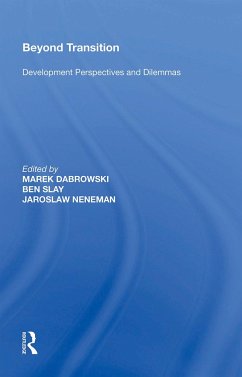The post-communist Central European and Baltic economies are now approaching the end of their transitions to well-functioning market systems. In some respects, the approaching EU accession and conclusion of the transition marks the end of a fascinating period in economic history. Beyond Transition focuses on the economic problems and issues facing Central Europe and the Baltics, the Balkans, and countries belonging to the Commonwealth for Independent States (CIS) in the post-transition context. This focus reflects the need to better understand two processes that are increasingly apparent in the post-communist economic space. First, many of the problems now facing policy makers in post-communist economies - choice of exchange rate regime, tax reform, labour market regulation, improving corporate governance - also face policy makers in developed and developing countries in other parts of the world. Second, the EU's eastern enlargement and the policy agendas facing the first wave accession candidates have major implications for the CIS and Balkan countries that have not been (and may never be) invited to join this process.
Bitte wählen Sie Ihr Anliegen aus.
Rechnungen
Retourenschein anfordern
Bestellstatus
Storno

